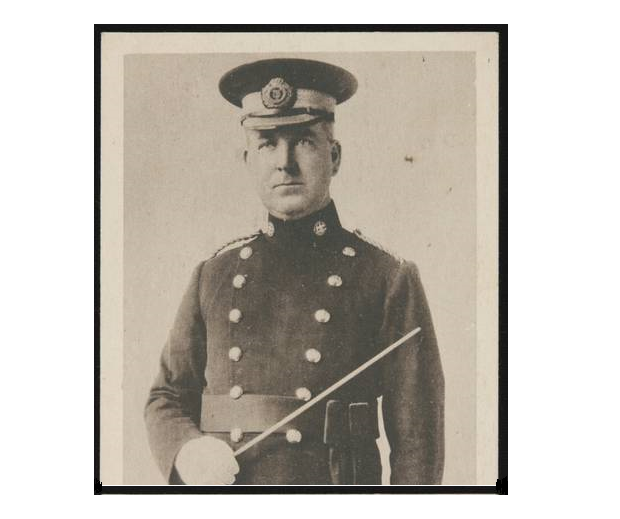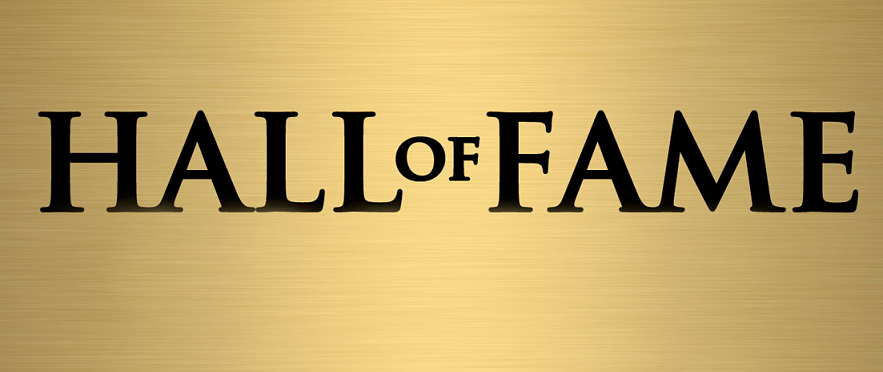
Brass band historian Tim Mutum has been asked by 4BR to curate a ‘Hall of Fame’ of players, conductors, composers, adjudicators, entrepreneurs, administrators and personalities who have helped to shape as well as drive the brass band movement from its beginning to the modern day.
Fame can be lasting and indelible or fleeting and ephemeral – from the names who appear on contest record rolls of honour to those who made contributions to greatness in other ways around the brass band globe.
Fame can be lasting and indelible or fleeting and ephemeral – from the names who appear on contest record rolls of honour to those who made contributions to greatness in other ways around the brass band globe.
The undisputed giants of Gladney, Rimmer and Mortimer will of course be included, but so too those who may not so readily be spoken of as ‘greats’ but whose contribution should without doubt be marked.
We hope you enjoy the series, which we also hope will be added to with further information about each person as we develop it further.
Albert Baile (1882 - 1961)
The name of Albert Henry Baile is one that deserves to be revered in the brass banding world.
Born in Battersea London in August 1882, his family emigrated to Queensland in Australia in 1887, before later being attracted by the potential commercial riches of the goldfields surrounding Perth.
As a youngster Baile received tuition from a former graduate of the Royal Military School of Music – first on flute as well as clarinet and piccolo, before taking to the cornet and becoming a member of Boulder City Band.
Exquisite sweetness
As a young man (he married in 1903 and took over his father’s greengrocer business in 1910) he soon made a name for himself as a soloist, becoming the principal cornet of Perth City Band by 1908.
A critic hearing him play in a concert in 1910 said that “...the cornet of Mr Baile in the intermezzo captivated the crowd with its exquisite sweetness.”
In 1913 he took over the baton from his mentor Bill Partington, leading Perth City to several State titles while bandmaster (1913-20).
A critic hearing him play in a concert in 1910 said that “...the cornet of Mr Baile in the intermezzo captivated the crowd with its exquisite sweetness.”
Newcastle
In March 1920 he was appointed bandmaster of the Newcastle Steel Works Band in New South Wales.
He worked at the company ostensibly as a clerk, although his talent lay in music making, soon leading the band to the B Grade and then A Grade New South Wales Championships, helped by number of key players recruited from his old Perth Band.
Soon they made their mark in winning the Queensland Championship and became rivals to the pre-eminent band of the day of Malvern Tramways.
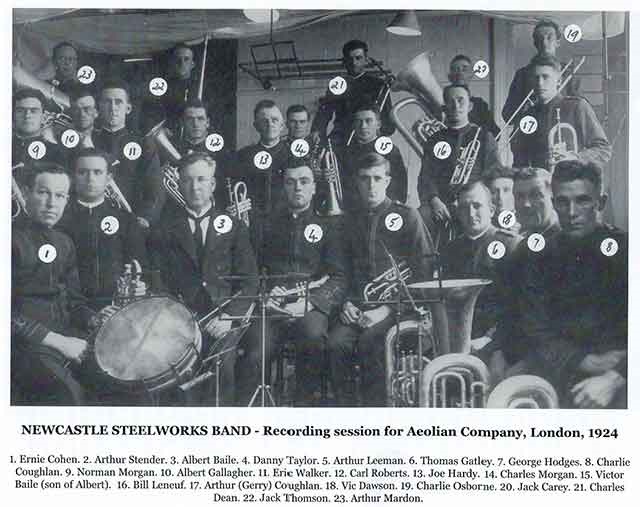
International fame
International fame however came with the epic 1924 tour to Great Britain as part of what was to be a visit to represent Australia at the British Trade Exhibition held at Wembley Stadium.
Under Baile, the band performed a record of engagements at the event over the next three months, regularly giving two or three concert performances each day.
However, the band also explored further afield - making a remarkable impression on the British banding public, who found their level of virtuosity led by their remarkable solo cornet player Arthur Stender in particular, something to behold.
The reverberations of their performance of ‘Sonata on the 94th Psalm’ by Julius Ruebke were felt from Queensbury to Queensland.
In the June they laid down their marker - winning first prize at what was unofficially called the ‘British Empire Contest’ in Halifax, beating the mighty English giants of Foden’s, Irwell Springs and Black Dyke in the process right in the heartland of Yorkshire banding,
The reverberations of their performance of ‘Sonata on the 94th Psalm’ by Julius Ruebke were felt from Queensbury to Queensland.
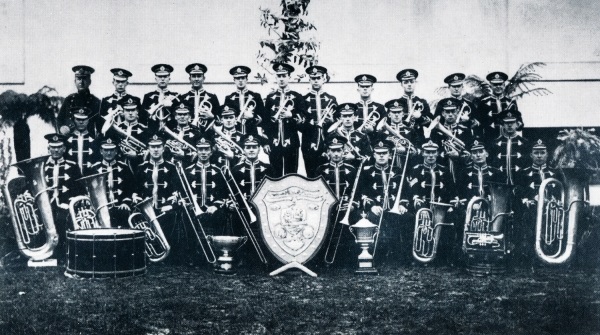
British Open victory
A few weeks later they became the first overseas winners of the British Open - a triumph masterminded by Albert Baile on a ‘Liszt Selection’. In the programme, his address was given as c/o Australia House, The Strand, London.
Although they were not allowed to take home the famous Gold Trophy (presented for the very first time) their name now adorns it for eternity. It simply says: 1924: Won by Australian Newcastle Steel Works Band at Belle Vue, Manchester
A more curious, but lasting legacy however is that the band was the first to perform in the now traditional seating formation we take for granted. Each player took to the stage carrying his own chair.
It was reported that the eventual result was greeted with warm applause.
A more curious, but lasting legacy however is that the band was the first to perform in the now traditional seating formation we take for granted. Each player took to the stage carrying his own chair.
Heroic return
Later that month they were invited to take part in the National Championships at Crystal Palace – coming third behind winners St Hilda Colliery and Black Dyke. Baile returned home a hero.
In 1926 he returned as the conductor of the Australian Commonwealth Band which toured Britain, North America and South Africa before heading to New Zealand and Australia. And whilst there was to be no repeat of the 1924 British Open triumph (the band came fourth) the band were popular visitors.
During the following years he led them on further world tours before they disbanded in 1928. Baile then settled in Sydney.
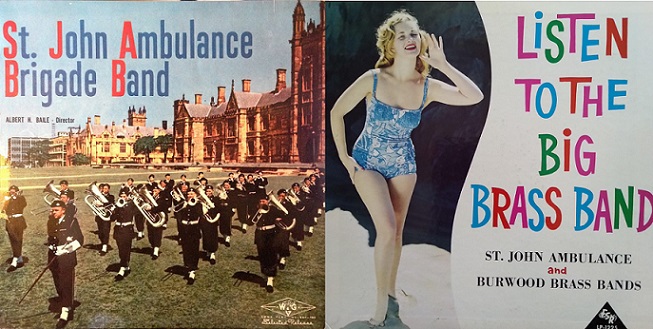
Bondi Beach
In 1931 he was made conductor of the Bondi Beach Concert Band (winning a number of State Championships) which was eventually to become the St John Ambulance Brigade Band, New South Wales District, in 1938.
Baile became a district officer in the brigade as well as the band’s Musical Director, leading them to an unprecedented period of success, undefeated under his baton in any contest between 1948 and 1959.
Further State Championships were secured in 1939, 1941, 1958 and 1959, with National titles won in 1948, 1950, 1951, 1953, 1955 and 1956.
Their dominance was only stopped as the national contest was not held in 1949 and 1954 (due to a polio epidemic).
Their dominance was only stopped as the national contest was not held in 1949 and 1954 (due to a polio epidemic).
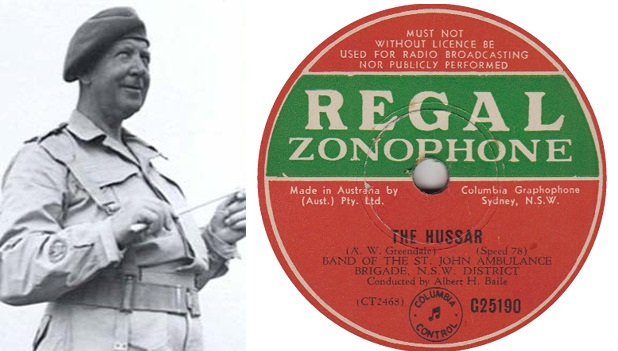
War service
In 1941 Baile was given the rank of Warrant Officer in the Army to take charge of the bands in the 7th Military Command and 7th Garrison Headquarters Band. He later conducted the 1st Divisional Concert Band and in 1944 became bandmaster of the 1st Australian Armoured Brigade Band.
He was promoted to lieutenant in November 1945 and was discharged with honour in April 1946. Such was his reputation that he presented two farewell concerts at Sydney Town Hall.
He was a dominant force in Australian banding for the huge majority of his life - one which was perhaps defined by him leading the Newcastle Steel Works Band to its historic 1924 September British Open success, but which was in retrospect, much, much more than that.
Versatility
A musician of immense versatility (he was a respected adjudicator), he also made his mark as a conductor in the theatre and stage domains, and was presented with a testimonial from thankful members of the Newcastle Operatic Society prior to his 1924 departure to England.
Albert Baile died on 14th March 1961 aged 79 at his Bondi Junction home. He was survived by his wife, son and daughter.
Throughout his career he made 36 appearances as conductor in band contests, winning 22 of them.
He was a dominant force in Australian banding for the huge majority of his life - one which was perhaps defined by him leading the Newcastle Steel Works Band to its historic 1924 September British Open success, but which was in retrospect, much, much more than that.
Tim Mutum
4BR Hall of Fame: No.1: Jack Atherton
https://www.4barsrest.com/articles/2019/1832.asp



